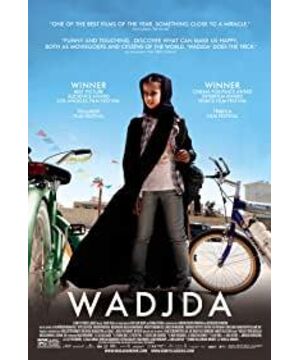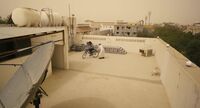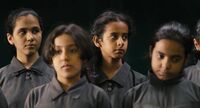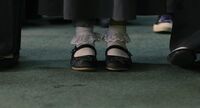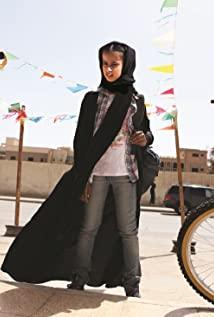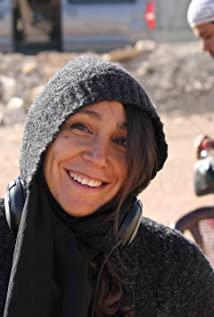Saudi Arabia, the holy land of Islam, is full of strong religious culture. The low social status of women is manifested in many aspects of social life. For example, women must go out with a black veil and face, so that they cannot be seen by strangers; women must be accompanied by men when they go shopping; they must seek the consent of men when they go out to work or travel; Polygamy, women can only be loyal to one man, etc. All of these show the inequality between men and women under the social system, the low social status of women and the inability to enjoy the same rights and treatment as men. Sadly, most Arab women are accustomed to this injustice, and even strict with this Claim to be proud of yourself.
Waganda's mother is a model of abiding by women's morals in this society. She puts her husband first in everything and takes pleasing her husband as her duty. The whole core of her life is her husband. As a result, her husband resolutely married his second wife. .
Waganda, an outlier of her kind, is not from the same planet as her mother or even the well-behaved elders of the same age. "Alien" Waganda's performance in school can be described as naughty. In the world of women covered by a black veil, she tends to face the sky, paints her nails secretly, wears canvas shoes, listens to popular songs, plays with boys, and is rebellious and perverse. In fact, such children are not uncommon in every country, even very common. Every child in this age group likes to do good things to show their difference. However, Waganda's distinctiveness does not seem to be "pretending" or "doing". It is a self-declaration buried deep in the bones, a declaration of self, a declaration of freedom, and a loud protest against all traditions.
The film tells the story of Waganda's dream of a green bicycle. After her mother's strong opposition and rebuke, she did not give up because of it. To this end, she did not hesitate to study the "Koran" in order to win a huge bonus to realize her dream, but the result backfired. In the end, though, she still got her beloved bike, just in another way, and the ending is similar to "Little Shoes".
The conflict between Waganda's parents is in stark contrast to Waganda's behavioral experience. As a typical mother of a good wife and mother, she took good care of her husband and Waganda, desperate to prevent her husband from marrying again, but in the end she was unable to win her husband's heart. And Waganda's father, every time he quarreled with his wife, would run away from home, and his responsibility for the family only stayed in a few words of affirmation. Husband and father, these two titles, for Waganda's father, it seems that the title of son is not easier to come by, and more competent to do.
Little Waganda is full of personality, and she has a childhood friend, Apdura. Waganda often played with Apdura regardless of the strange eyes of others, rode his bicycle, accepted his gifts, and enjoyed his protection and dedication to her as it should have been. The two were sincere to each other. Apdura seemed to have a heart-to-heart with Waganda. For all of Waganda's seemingly "extraordinary" actions, he regarded it as normal and supported and encouraged her, protecting and loving her everywhere. When Waganda confronted the driver for his mother, Apdura's powerful kick on the door and his righteous warning; the assistant installed by Apdulla who was afraid that Waganda would be injured when riding a bicycle at the beginning Lun and the helmet he gave to Waganda all prove that this seemingly small and inconspicuous little boy will grow into a man in the future. would go the way of her mother and most Arab women.
In herself, she has dreams; in love, she has herself.
Bicycles are a symbol of freedom. Waganda's desire for bicycles expresses her desire for freedom, and also implies that she also wants to ride bicycles like boys, and her inner dream of pursuing equality is hazy. In addition, her act of pinning her name on the family tree on the wall at home also shows her desire for equality between men and women.
This film borrows the story of a little girl who wants to buy a bicycle, which is intended to resist the unequal social system between men and women in Saudi Arabia. Freedom is not the exclusive right of men; religious customs are not the iron shackles that men use to restrain women and implement unbridled patriarchy over women.
One Waganda can only realize his desire to own a bicycle, and what thousands of Waganda can achieve will not only be the desire to own a bicycle, but more.
View more about Wadjda reviews


